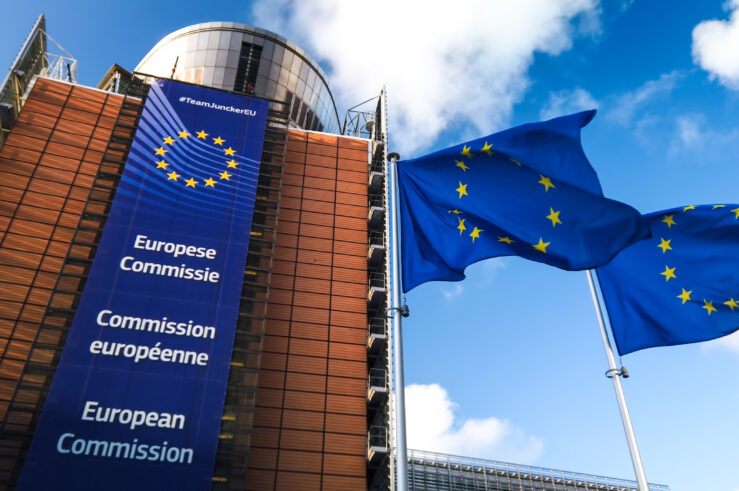Showing results for: “digital markets act”
The AI Act and Regulatory Overaggregation
It appears that the emergence of ChatGPT and other artificial-intelligence systems has complicated the European Union’s efforts to implement its AI Act, mostly by challenging its underlying assumptions. The proposed regulation seeks to govern a diverse and rapidly growing AI landscape. In reality, however, there is no single thing that can be called “AI.” Instead, the category comprises ... The AI Act and Regulatory Overaggregation
If Necessity Is the Mother of Invention, New EU SEP Rules Are Decidedly Unnecessary
An unofficial version of the EU’s anticipated regulatory proposal on standard essential patents (SEPs), along with a related impact assessment, was leaked earlier this month, generating reactions that range from disquiet to disbelief (but mostly disbelief). Our friend Igor Nikolic wrote about it here on Truth on the Market, and we share his his concern that: As it currently stands, it appears the regulation will ... If Necessity Is the Mother of Invention, New EU SEP Rules Are Decidedly Unnecessary
Biweekly FTC Roundup: But Wait, There’s More Edition
More, and not just about noncompetes, but first, yes (mea culpa/s’lach lanu), more about noncompetes. Yesterday on Truth on the Market, I provided an overview of comments filed by the International Center for Law & Economics on the Federal Trade Commission’s (FTC) proposed noncompete rule. In addition to ICLE’s Geoffrey Manne, Dirk Auer, Brian Albrecht, Gus Hurwitz, and ... Biweekly FTC Roundup: But Wait, There’s More Edition
The FTC’s Noncompete Rule: A Bridge Too Far
As I noted in January, the Federal Trade Commission’s (FTC) proposal to ban nearly all noncompete agreements raises many questions. To be sure, there are contexts—perhaps many contexts—in which noncompete agreements raise legitimate policy concerns. But there also are contexts in which they can serve a useful procompetitive function. A per se ban across all industries and occupations, as the ... The FTC’s Noncompete Rule: A Bridge Too Far
Digital-Market Regulation: One Size Does Not Fit All
Regulators around the globe are scrambling for a silver bullet to “tame” tech companies. Whether it’s the United States, the United Kingdom, Australia, South Africa, or Canada, the animating rationale behind such efforts is that firms like Google, Apple, Meta, and Amazon (GAMA) engage in undesirable market conduct that falls beyond the narrow purview of antitrust law (here and here). To tackle these supposed ... Digital-Market Regulation: One Size Does Not Fit All
European Commission’s Leaked SEP Regulation Would Increase Costs for Innovators, Hurt EU Competitiveness, and Fail to Reduce Litigation
The European Commission is working on a legislative proposal that would regulate the licensing framework for standard-essential patents (SEPs). A regulatory proposal leaked to the press has already been the subject of extensive commentary (see here, here, and here). The proposed regulation apparently will include a complete overhaul of the current SEP-licensing system and will ... European Commission’s Leaked SEP Regulation Would Increase Costs for Innovators, Hurt EU Competitiveness, and Fail to Reduce Litigation
Biweekly FTC Roundup: Antitrust Woodstock Edition
Last week’s roundup was postponed because I was kibbitzing at the spring meeting of the American Bar Association (ABA) Antitrust Section. For those outside the antitrust world, the spring meeting is the annual antitrust version of Woodstock. For those inside the antitrust world: Antitrust Woodstock is not really a thing. At the planetary-orbit level, the ... Biweekly FTC Roundup: Antitrust Woodstock Edition
What the European Commission’s More Interventionist Approach to Exclusionary Abuses Could Mean for EU Courts and for U.S. States
The European Commission on March 27 showered the public with a series of documents heralding a new, more interventionist approach to enforce Article 102 of the Treaty on the Functioning of the European Union (TFEU), which prohibits “abuses of dominance.” This new approach threatens more aggressive, less economically sound enforcement of single-firm conduct in Europe. ... What the European Commission’s More Interventionist Approach to Exclusionary Abuses Could Mean for EU Courts and for U.S. States
When Bad Antitrust Costs Lives: The Illumina/GRAIL Tragedy
Regrettably, but not unexpectedly, the Federal Trade Commission (FTC) yesterday threw out a reasoned decision by its administrative law judge and ordered DNA-sequencing provider Illumina Inc. to divest GRAIL Inc., makers of a multi-cancer early detection (MCED) test. The FTC claims that this vertical merger would stifle competition and innovation in the U.S. market for ... When Bad Antitrust Costs Lives: The Illumina/GRAIL Tragedy
Why Competition Enforcers’ Annual Roundtable Should Focus on Competition Advocacy and Combating Anticompetitive Market Distortions
Spring is here, and hope springs eternal in the human breast that competition enforcers will focus on welfare-enhancing initiatives, rather than on welfare-reducing interventionism that fails the consumer welfare standard. Fortuitously, on March 27, the Federal Trade Commission (FTC) and U.S. Justice Department (DOJ) are hosting an international antitrust-enforcement summit, featuring senior state and foreign ... Why Competition Enforcers’ Annual Roundtable Should Focus on Competition Advocacy and Combating Anticompetitive Market Distortions
Biweekly FTC Roundup: Throwing Stones in Glass Containers Edition
In February’s FTC roundup, I noted an op-ed in the Wall Street Journal in which Commissioner Christine Wilson announced her intent to resign from the Federal Trade Commission. Her departure, and her stated reasons therefore, were not encouraging for those of us who would prefer to see the FTC function as a stable, economically grounded, ... Biweekly FTC Roundup: Throwing Stones in Glass Containers Edition
Is the FTC Threatening Efficient Franchise Relationships?
Franchising plays a key role in promoting American job creation and economic growth. As explained in Forbes (hyperlinks omitted): Franchising as a business institution is oriented toward reducing economic inefficiencies in commercial relationships. Specifically, economic analysis reveals that it is a potential means for dealing with opportunism and cabining transaction costs in vertical-distribution contracts. In ... Is the FTC Threatening Efficient Franchise Relationships?












